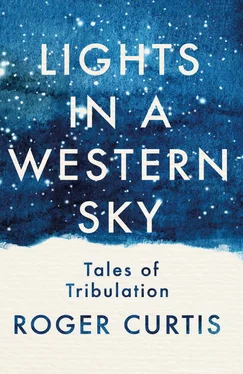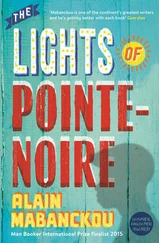But gradually the previous silence again prevailed, as if a dampening blanket had been drawn over the entire forest. Then, after what might have been half a minute or ten, Rupert made the inevitable association. Icy fingers of fear explored his body and he began to sweat profusely. He found that, by increasing his stride, it was possible – for just a few moments – to re-summon, in the minutest measure, the living manifestations of the forest. But with their demise came the certain knowledge that his companion was closing upon him. He looked back but saw nothing. He wanted to run, but Africa had taught him that the consequences of flight were seldom advantageous. So he stood still, as a condemned man might wait, unspeakably fearful. The footsteps behind were measured and purposeful. They stopped, but still Rupert did not turn.
What surprised him most was the strain in Jackson’s voice, as if he had reached a decision of awesome magnitude that had drained his body. ‘You are fortunate, Dr Murchison,’ he said.
‘To have survived this far?’ Rupert replied, with a levity so inappropriate that it elicited no response. But he knew that the crisis – whatever it was – had passed.
After a few seconds Jackson said simply, ‘If you continue along this path you will reach the township. There will be people to help you.’
Rupert did not look back and did not see Jackson again. Ahead was a pinpoint of light in the far distance. A minute later he emerged from the forest.
The miscellany of low buildings – some brick with tin roofs but mostly of mud and thatch – had the same exaggerated incongruity as any remote colonial outpost from the early days. Even in the dim lamplight, Rupert could see frangipani, oleander and bougainvillea in profusion. He remembered that Muhoroni – if indeed this was the place – was still a district centre. However undeservedly, it still possessed a district officer.
It was not difficult to find the house, perched on a ridge, encircled by lawns and trees, all enclosed by a neatly trimmed hedge at odds with everything outside it. It was the ultimate distillation of British colonial style. Lighted oil lamps at intervals along the veranda each cherished its own microcosm of swarming insects, illuminating the palms in their pots below.
At the door the sullen eyes of the houseboy expressed anxiety rather than the usual resentment. ‘Bwana is not home. He has important business.’
‘I need somewhere to stay,’ Rupert said.
‘It is not possible here.’
‘Then perhaps the memsahib…’
‘Bwana said…’
A woman’s voice, clear and melodious, called out, ‘It’s all right, Mwangi. Dr Murchison is welcome. You can leave us.’ It came from the past, with the same sweet bite that he’d tried so hard to forget. As she emerged onto the veranda her slender figure seemed little changed.
Being independent of the process, Rupert had never concerned himself with the cruel lottery that was the posting of government officers. And when it happened he was indifferent to the squeals of delight or despair. It shouldn’t have surprised him to find Catherine in this forsaken place, but it did because her bonding with Nairobi society had seemed unbreakable. Even now – whatever his feelings for her might be – it seemed, if nothing else, unfair. What despot sweating behind his desk would have taken pleasure in transplanting such a flower? But therein, he thought later, lay the probable explanation.
That she seemed pleased he was there contrasted sharply with his memory of their last, bitter, encounter. She came to stand close to him.
‘Let me just say I’m sorry, Rupert. I did not set out to hurt you.’
‘You succeeded with a vengeance.’
‘A married woman – even in Nairobi – is like a caged beast, always under scrutiny. It could not have continued.’
‘It didn’t seem to bother you with others.’
‘Times were changing. Please, may we put it behind us?’
Rupert smiled ruefully. ‘I suppose I must, if I want shelter. By the way, where is Richard?’
‘Out. Away. I’ll tell you about it. But first, where on earth have you been? People from the train were here hours ago. They’re all up at the guesthouse.’
Rupert was incredulous. ‘You know about the train?’
‘It was almost at the station. I had a look myself.’
‘Then I have a mystery on my hands.’
‘Well, I hope it’s nothing to do with Richard’s wild goose chase.’
He followed her inside, into that strange mixture of cultures that typifies the dwellings of colonial government servants: a print of a Constable on the wall next to a fading zebra skin, drawings of orchids – for she was a gifted artist – alongside west African masks. Rupert recognised them all. She set a lamp on the table in the dining room and they sat facing one another, sparring in the way – or so Rupert imagined – of all ex-lovers brought together by chance, reliving the dregs of their first attraction.
‘Richard told me you are leaving us soon.’
‘After I’ve collected my things from the Lake. I sail from Mombasa on Monday.’
‘Only four days!’
‘You’re safe, then.’
Catherine’s eyes widened with anger augmented by fear. The bitterness against the perceived injustice of the transfer erupted in a torrent. ‘Safety is the last bloody thing I’m after in this hell-hole,’ She was immediately ashamed. ‘I’m sorry, Rupert. That wasn’t the cool hostess you once knew, was it?’
‘It’s a strange feeling to think I’ve touched base – something solid at last. That never happened before. With you, I mean.’ He leaned back in his chair, the better to scrutinise her face.
‘It came close at times,’ she whispered.
‘Then you might have shown it.’
There were shadows beneath the hazel eyes that were not just tricks of the light. Rupert had seen before the hall-marks of loneliness in those forced to forego social advantage for the greater good. And Catherine was the most inflexible of subjects. He knew, too, that Richard could not fill the void. He could feel his own heartbeat and saw his fingers tremble as he reached for the glass she pushed towards him. He hoped she hadn’t noticed. He began to recognise within himself a developing conflict in which sympathy and the settling of scores were joined by a third contender – a reawakening of the same passion he had felt all those years ago. Then – could it have been by chance? – her foot brushed his.
‘In case you’re still wondering,’ she said, ‘Richard’s gone to sort out some panic with the Nandi. There’s been a return of their favourite form of persecution, where things come out of the forest and leave them in a bit of a mess.’
‘The chemosit?’
‘You know? Ah, but you would, wouldn’t you, as a zoologist. Everyone thought it had stopped a few years ago, but it seems it hasn’t.’
‘Actually, someone told me on the train.’
‘Anyone interesting?’ She said it dreamily, distantly, as if not expecting an answer.
‘A Jackson somebody.’
‘Oh… yes. I know him. He’s the minister here.’
Rupert felt the warmth of her bare foot on his own. It was, he remembered, how it had started, at their house at the foot of the Ngong Hills just after he had arrived in Kenya ten years before. Living in a tent nearby, he must have seemed eccentric enough to warrant an invitation from Richard Hedley. The rapid path he had trodden then, even with hindsight, was no less inviting now. He could not prevent himself saying, ‘Your boy – when does he leave?’
‘As soon as he’s cleared the kitchen.’
They waited in silence, fingers touching tentatively across the table, until the door slammed and the footsteps were absorbed into the night. Rupert wanted to tell her about Jackson, but the risk of diverting her attention held him back.
Читать дальше












